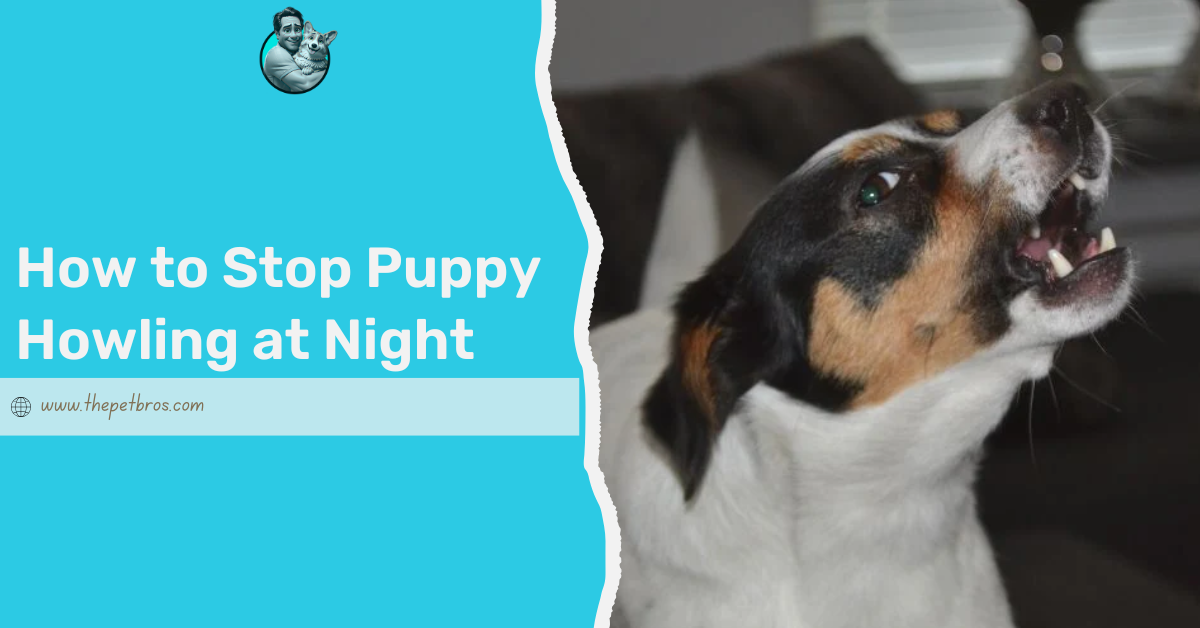It’s 2:13 am. You’re half-asleep. The house is quiet and then… whiiine! A soft, squeaky cry from the corner of the room. Or worse, right beside your bed. And it’s not once. It’s every night. You start wondering the reasons your dog whines at night. I mean, your pup’s not in pain. They’ve had dinner and been walked. So what’s going on?
At first, you might think your pup’s just being dramatic, maybe they miss you, they could be bored, or they just remembered a ball they didn’t catch. But here’s the truth: dogs don’t whine at night just for fun. It’s their way of saying something’s off, even if they’re not sure what it is.
This blog breaks down the most common reasons your dog whines at night and what you can do to restore peace. Your bed should be for sleeping, not decoding emotional Morse code from your dog.
9 Possible Reasons Your Dog Whines at Night
1. They Need to Use the Loo
Let’s start with the more practical one. Your dog’s whining might be a polite midnight reminder of nature’s calling. Puppies and older dogs can’t hold their pee in as long as others because of their stomach’s sensitivity. However, even the most well-trained pup has its limits.
Your dog can’t just get up, find the light switch, and quietly nip off to the toilet like you do. Their only option is to let you know, and that’s why they resort to whining till you get the hint. And if you’ve ever tried to roll over and ignore it, you probably found yourself googling how to get dog pee out of your couch the next morning.
If night-time whining that starts off gently eventually becomes more urgent, especially if it’s followed by pawing at the door or pacing near the exit, then it is a big clue.
Build a consistent toilet routine around your dog’s needs. Ensure they get a proper toilet break just before bed, not a rushed outing where they only sniff and get distracted. Consider moving dinner time earlier, and avoid giving water too close to bedtime, especially if they’re still young. Don’t forget to talk to your vet if you notice it happening too frequently.
2. Separation Anxiety Can Keep Your Dog Up at Night
You’d think your dog would be fine sleeping a few feet away after a full day of cuddles, belly rubs, and being followed to the bathroom. Nope! In fact, the long hours they spend glued to you all day make them more clingy.
Dogs are pack animals, and being alone, especially at night, can trigger their anxiety and that anxiety is one of the major reasons your dog whines at night. This explains why you’ve noticed your dogs whining, pacing, and scratching at the door when everything goes dark. This isn’t about being naughty. It’s about feeling unsure, unsafe, or just plain sad when you’re not close.
You can start with small steps. Move their bed closer to yours or place a worn T-shirt nearby so they can smell your scent. Stick to a consistent bedtime routine, but avoid turning the whining into a cuddle cue.
3. Your Dog is in Pain or Discomfort
This is the part you need to get serious. Not all dog whines are about habits, fear, or attention. Whether your dog is whining during the day or only at night, it usually means it is simply in pain. Their pain, coupled with the anxiety of nighttime, makes that discomfort worse, especially when they’ve been lying in one position too long or are trying to rest with something bothering them, making pain and discomfort the top reasons your dog whines at night.
It could be aching joints, an upset tummy, or even something as small as a thorn in the paw. Dogs won’t always yelp or limp. Whining is the only clue you’ll get before it gets worse.
Pay attention to patterns. If the whining is accompanied by panting, restlessness, or a sudden behaviour change, call your vet. Trust your gut. You know your dog better than anyone, and if something feels off, it probably is.
4. They’re Just a Puppy
Of course, your puppy whines at night. Why? Because they are in the baby phase, acting all cute during the day, but chaotic after dark. Nighttime whining is a rite of passage if your dog is still a pup. They’ve just left their mum, their littermates, and everything that made them feel safe. Now they’re expected to sleep alone in a quiet room? It’s a lot.
Start building positive bedtime routines. Crate training will help your puppy feel secure. You can place something with your scent nearby, keep the room calm and quiet, and don’t rush to them every time they cry. Reassurance is excellent, but overdoing it can make the habit stick.
5. Their Fear of Noises or the Dark
Are you noticing a pattern? Most dogs are not big fans of the dark; at night, shadows move, shapes change, and the familiar suddenly feels unfamiliar. It is another big player in the reasons your dog whines at night. You might think your house is peaceful at night, but to your dog, it’s a new world of strange creaks, distant sirens, and rustling leaves. Every little sound can feel like a potential threat for a sensitive dog.
First thing, dedicate time to helping your dog sleep through the night, which involves creating a calm night environment. Leave on a dim light or plug in a soft night lamp. Try playing white noise or calming music to drown out unfamiliar sounds. If your dog’s fear seems intense or sudden, don’t dismiss it; speak with your vet.
6. Your Dog is Either Bored or Lack of Mental Stimulation
Have you ever tried going to bed after sitting around all day doing absolutely nothing? Dogs feel that, too. If your pup hasn’t had enough physical exercise or mental stimulation, bedtime might feel less like rest and more like forced boredom, so they start whining.
This is common with high-energy breeds; a lazy day can lead to a noisy night if your dog, who’s not challenged or tired, finds their own way to entertain themselves.
Make sure your dog’s getting enough stimulation during the day. You can add evening playtime, puzzle toys, sniff walks, or short training sessions to their routine to help tire them out mentally and physically.
7. Inconsistent Training Might Be the Reason Your Dog Whines At Night
Dogs are clever. If they whine at night and it gets them cuddles, snacks, or even just a “Shhh,” they’ve learned something valuable: noise equals attention. Without meaning to, we sometimes train our dogs to keep doing the very thing we’re trying to stop. One night of giving in can turn into a nightly routine, and before you know it, your dog has a new bedtime ritual complete with whining.
If your dog is healthy, has gone to the loo, and isn’t afraid or in pain, try to avoid responding to every whine. Instead, reward the calm. Reinforce quiet behaviour with praise, and don’t let guilt push you into patterns you’ll end up regretting at 3 am.
8. They Have Digestive Trouble or Bloating
That nighttime whining can sometimes come from the gut. If your dog has eaten too quickly, scarfed down something dodgy, or has a sensitive stomach, the discomfort can hit hardest when everything quiets down. Gas, bloating, or indigestion may not seem serious, but they could be the reasons your dog whines at night.
It won’t be easy, as you can’t dedicate your days to strictly watching your dogs. However, try as much as possible to watch your dog’s eating, especially in the evening. Slow-feeder bowls can help fast eaters, and sticking to a simple, vet-recommended diet can prevent late-night drama. If this issue persists, go to your vet immediately.
9. Cognitive Changes in Older Dogs
Now, if your dog’s getting older and the nighttime whining feels new, best believe it’s not a habit, nor is it boredom. Older dogs can experience something similar to dementia, known as Canine Cognitive Dysfunction. It affects memory, routine, and sometimes even their sense of time.
That’s why you are confused about why a dog who once slept soundly may now pace, whine, or stare at walls in the dark, not quite sure where it is or what it needs. It’s not attention-seeking; it’s confusion, and it can be heartbreaking to watch.
In this case, just stick to a consistent routine, keep night-time environments familiar, and try not to rearrange their sleeping space too often. Speak to your vet about supplements, calming aids, or medications that can help manage cognitive decline. Most of all, be patient; your dog needs all that love.
Conclusion
Think of whining at night as your dog’s way of communicating their needs. The key is to listen without jumping to conclusions. Rule out pain. Watch for patterns. And above all, stay consistent. So, honestly, none of the reasons your dog whines at night is to intentionally ruin your sleep. They’re simply trying to feel safe, understood, and cared for.
Frequently Asked Questions
Why does my dog whine only when I leave the room at night?
It’s likely separation anxiety. Your dog feels safest near you and may need gradual training to sleep independently.
How can I tell if my dog is whining from pain or just seeking attention?
Look for other signs, such as limping, restlessness, or sensitivity to touch. If you’re unsure, consult your vet to rule out anything medical.
Is it okay to let my dog sleep in my bed if it stops the whining?
It’s up to you! Just be consistent. If you allow it sometimes and not others, the confusion might worsen the whining.
Can certain breeds be more vocal at night?
Yes, some breeds, such as Huskies, Beagles, and Chihuahuas, are naturally more expressive and may whine or howl more frequently than others.














